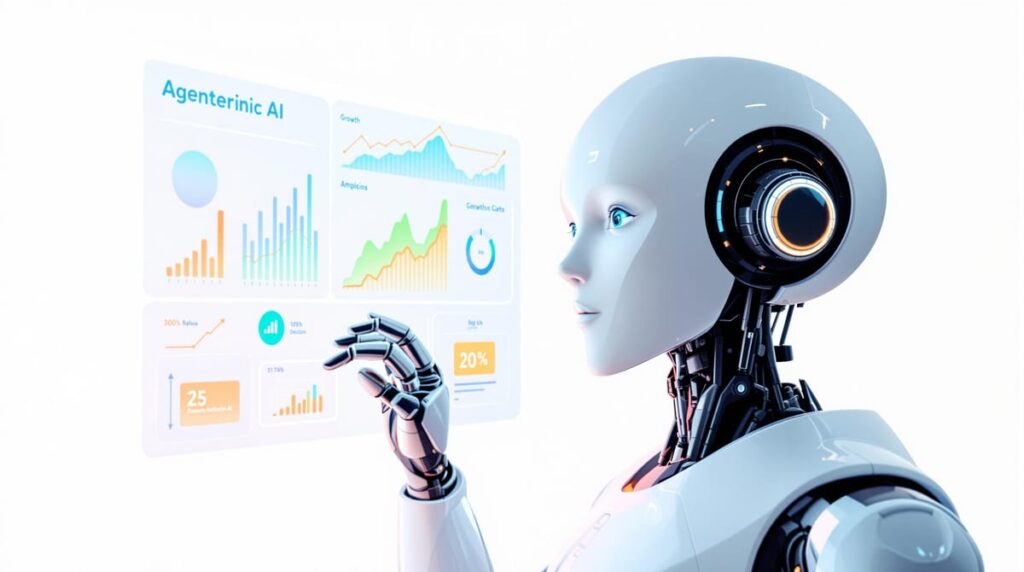In 2025, something powerful has been quietly shifting in the AI landscape — a transformation from tools that respond, to entities that act. Meet agentic AI: autonomous agents capable of taking multi-step actions, not just generating output from prompts. With its arrival, the future of productivity, creativity, security, and even governance could look radically different.
In this blog, we’ll dive into:
- What agentic AI is, and why it’s the defining trend of late 2025
- Real examples and breakthroughs as of September 2025
- Challenges and ethical questions it poses
- How individuals, companies, and governments can prepare
- SEO keywords and trending ideas around agentic AI you need to watch
1. What Is Agentic AI — And Why Is It Now?
Agentic AI refers to artificial intelligence systems that go beyond static response-based behavior (like chatbots or generative text/image tools). These systems can plan, decide, and act — sometimes autonomously — across tasks that require chaining together actions, adapting to new information, managing long-running goals, possibly integrating with external systems.
Think of them as “digital agents” which can:
- Take initiative (not just wait for prompts)
- Automate multi-step workflows
- Interface with external tools, APIs, hardware
- Adapt, learn, correct based on feedback
Why is this trend peaking right now? Several converging factors:
- Computing power (advanced chips, cloud/GPU infrastructure) has improved.
- Improved large language models (LLMs), multi-modal models, and embedding architectures are better at context retention, planning, and decision making.
- Demand for automation and efficiency in business, especially in hybrid/remote work, has increased.
- Users want more than passive tools; they want assistants that help, automate and reduce repetitive work.
IBM has observed that “dominant innovation narrative in 2025 is the AI agent.”
So, 2025 is no longer just about generative AI; agentic AI is its natural evolution.
2. Agentic AI in Action — What’s New in September 2025
Here are some of the most interesting developments as of September 2025 that underscore how agentic AI is moving from concept to practice:
a) Global Policy & Regulation Enter the Fray
- The Axios AI+ DC Summit highlighted how U.S. and China are racing ahead in AI, and regulation is now a central theme. One of the big topics: how to ensure agentic systems don’t misuse their autonomy or displace jobs without oversight.
- The WTO World Trade Report 2025 suggests that bridging gaps in access to AI-enabling goods (chips, infrastructure, etc.) will be crucial as these agentic capabilities become widespread.
b) Corporate Moves and Big Investments
- Microsoft, Nvidia, and others are investing heavily in AI infrastructure in the UK, building data centres, and pushing for more local compute capacity. These investments help support agentic AI (which requires a lot of computation).
- Companies like Atlassian acquire specialized AI firms (e.g. tools to monitor engineer productivity) to better embed agentic workflows in software development.
c) Technological Innovation & Examples
- New smart glasses from Meta are expected at Meta Connect, featuring AI-powered features that anticipate user needs — a kind of agentic behavior.
- Huawei has unveiled plans to build AI “SuperClusters” using less powerful—but domestically produced—semiconductors to power large scale AI models. The architecture suggests more focus not just on raw power but efficient, agent-friendly infrastructure.
- “DeepSeek” and other emerging models are pushing forward in agentic AI behavior, combining reasoning, critique, and planning in more capable chatbots. (Some research & product experiments have shown models that handle multi-step reasoning better.)

3. Challenges, Risks & Ethical Considerations
Agentic AI has huge promise, but also big risks. As we accelerate, certain issues must be addressed proactively.
a) Safety, Accountability, and Control
- If AI agents are acting autonomously, who is responsible when things go wrong?
- How do we ensure agents don’t make harmful decisions, violate policies, or take actions unintended by their designers?
b) Bias, Transparency, Explainability
- Complex agents making decisions need to be transparent in how they decide which actions to take.
- Bias could creep in via reward functions, training data, or feedback loops.
c) Job Displacement vs Augmentation
- There are worries about agentic AI replacing jobs — especially repetitive or multi-step admin or operations work. But there’s also opportunity for augmentation: freeing humans from mundane tasks.
d) Infrastructure Demands, Resource Use
- Agentic AI requires more compute, energy, and data. Sustainability becomes a concern.
- Access inequality: organizations/countries without access to high compute or skill sets might be left behind.
e) Regulation, Policy, and Legal Frameworks
- Many governments are catching up. Regulation is being discussed (but outcomes are still uncertain).
- There’s a balance needed: encourage innovation, but ensure ethical guardrails.
4. How To Prepare — For Individuals, Companies & Governments
If you are a startup, enterprise, researcher, or policymaker, here are ways to not just follow but lead in the agentic AI era:
For Individuals / Professionals
- Build skills around AI agents: understanding prompt engineering, planning, integration with APIs.
- Learn about ethics, fairness, privacy. Familiarize with frameworks (e.g. AI governance, explainability).
- Get comfortable with hybrid human-AI workflows: using agents as assistants rather than replacements.
For Companies & Startups
- Evaluate where in your workflow multi-step tasks are repetitive and could be automated via agents.
- Invest in infrastructure (cloud, GPUs, edge computing) to support agentic systems.
- Develop internal policies: oversight, safety audits, monitoring.
- Collaborate with regulators and ethical oversight bodies.
- Focus R&D on explainability, control, interactive feedback loops.
For Governments & Policy Makers
- Work on clear regulation around agents: safety, liability, data privacy.
- Support infrastructure access: ensure broadband, cloud compute, and hardware are available, particularly in underserved areas.
- Fund research into safety, bias mitigation, fairness.
- Encourage transparency and standards: e.g. agents should disclose their levels of autonomy.
5. SEO Keywords & Topics to Watch
To ensure your content ranks well, and you stay current, here are keywords, topics, and angles that are gaining traction in September 2025:
- Agentic AI / autonomous AI agents
- Generative AI vs agentic AI
- AI regulation, AI governance 2025
- Ethical AI agents
- AI infrastructure: compute, clusters, SuperClusters
- AI-powered productivity tools
- Edge computing & AI agents
- AI in everyday life: wearables, smart assistants
- Explainable AI / AI transparency
- Sustainable AI: energy, resource use
- AI difference in developing vs developed economies
Also, case studies (companies, products) perform well, as do tutorial-style or how-to content (“how to integrate an AI agent in your workflow”, “setting up ethical guardrails for autonomous agents”, etc.)
6. Conclusion: Why Agentic AI Is This Month’s Defining Trend
By September 2025, it’s clear that agentic AI is not just hype. Technological infrastructure, corporate investment, research advances, and societal demand are aligning. We’re moving from “AI that responds” to “AI that acts”.
That shift brings opportunity: increased productivity, new forms of creativity, more accessible automation. But it also carries responsibility: we must design, regulate, and govern these systems carefully.
If you’re reading this and thinking about where to place your bets — agentic AI is a good one. The next few months will tell us which companies, which policies, and which use cases will lead. If you want, I can pull together recent agentic AI tools or examples particularly relevant to your industry (you tell me which) so you can use them in your strategy or content.
















